Politics
Arizona mining country produced Latino leaders for L.A. Now, some are staying
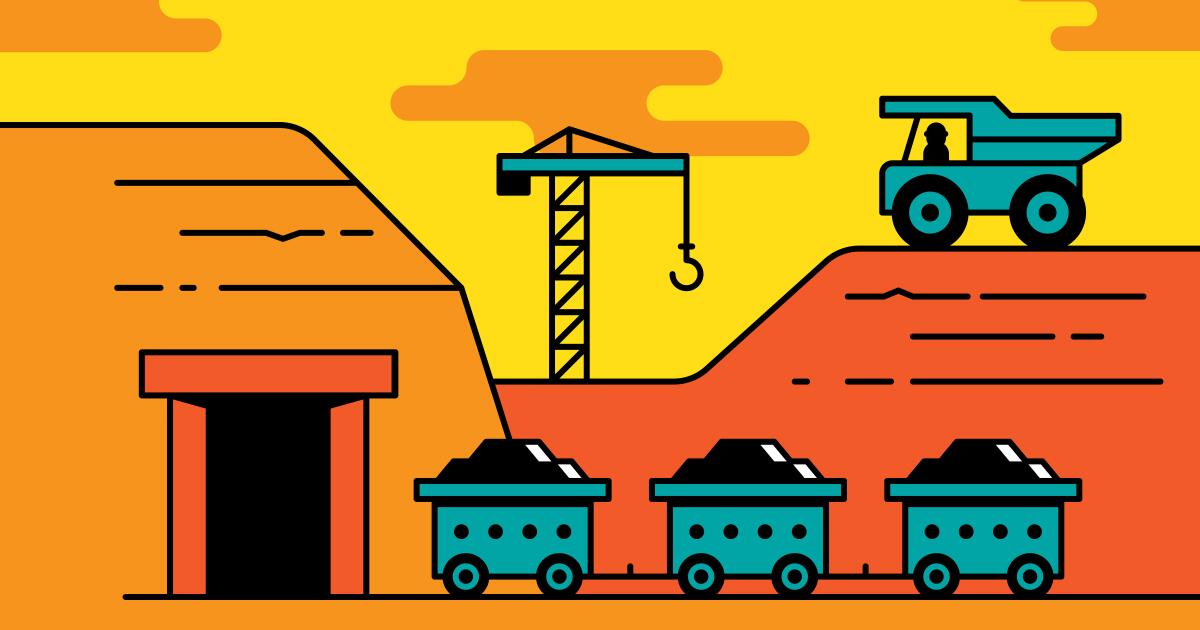
To get to Clifton, you have to really want to get to Clifton.
The nearest big city is Tucson, about three hours away. After spending the night at an uncharacteristically ratty Holiday Inn Express in Willcox, I took U.S. Route 191 through a succession of towns, each seemingly smaller than the last.
The morning drive was quiet and scenic through hills dotted with creosote bushes, spiky cacti and spindly ocotillo plants leading up to Safford, the hometown of a good friend who got the hell out of there. Route 191 bends east here, passing by blooming cotton fields nourished by the Gila River before the terrain becomes rockier and steeper.
Seven days. Seven states. Nearly 3,000 miles. Gustavo Arellano talks to Latinos across the Southwest about their hopes, fears and dreams in this election year.
Soon, I saw what has drawn so many to Clifton over the last 150 years: one of the world’s largest open-pit copper mines.
The Morenci mine looked like the Sarlacc monster from the “Star Wars” movies. Once-picturesque cliffs had been carved into a series of pale terraces that descended hundreds of feet. Dust rose from the bottom. Rows of houses with the same gray roofs stood below me as I drove past a training center operated by the mine owner, Freeport-McMoRan.
When you picture an Old West town, Clifton is it. A decommissioned railroad car stood gleaming next to the main road. A hole blasted out of a cliff once served as a jail cell, according to a plaque. Silhouettes of cowboys decorated a motel.
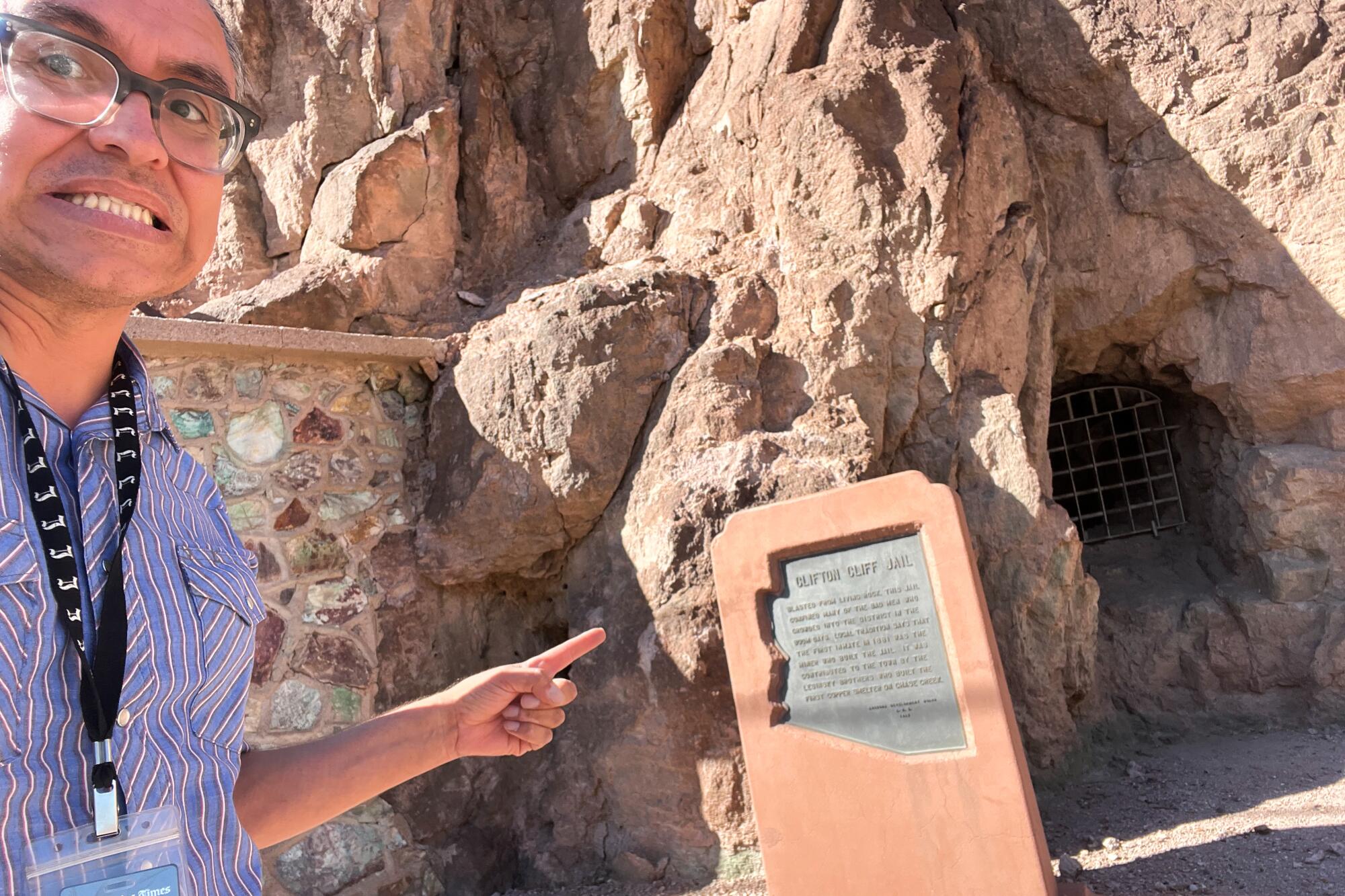
Times columnist Gustavo Arellano with a plaque commemorating a jail cell carved out of a cliff in Clifton, Ariz.
(Gustavo Arellano / Los Angeles Times)
I was looking for a different history.
For generations, Mexican immigrants have landed in this area before decamping to Los Angeles. Some of the most important names in L.A. Latino politics — former U.S. Rep. Esteban Torres, Councilmember Richard Alatorre, U.S. Treasurer Romana Acosta Bañuelos — were born in Arizona mining towns or traced their lineage there.
I share those roots.
1

2
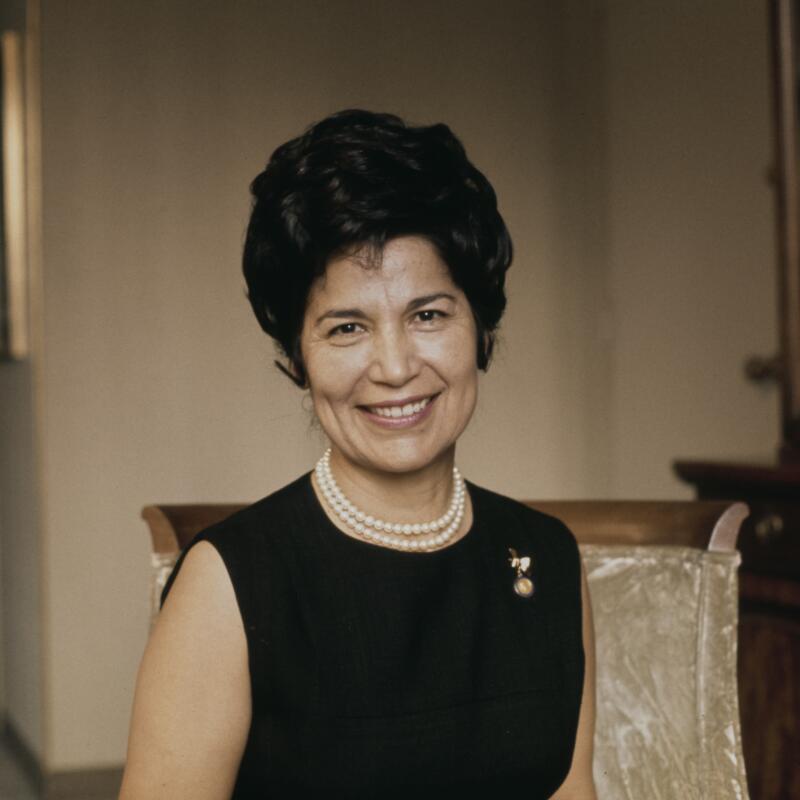
3
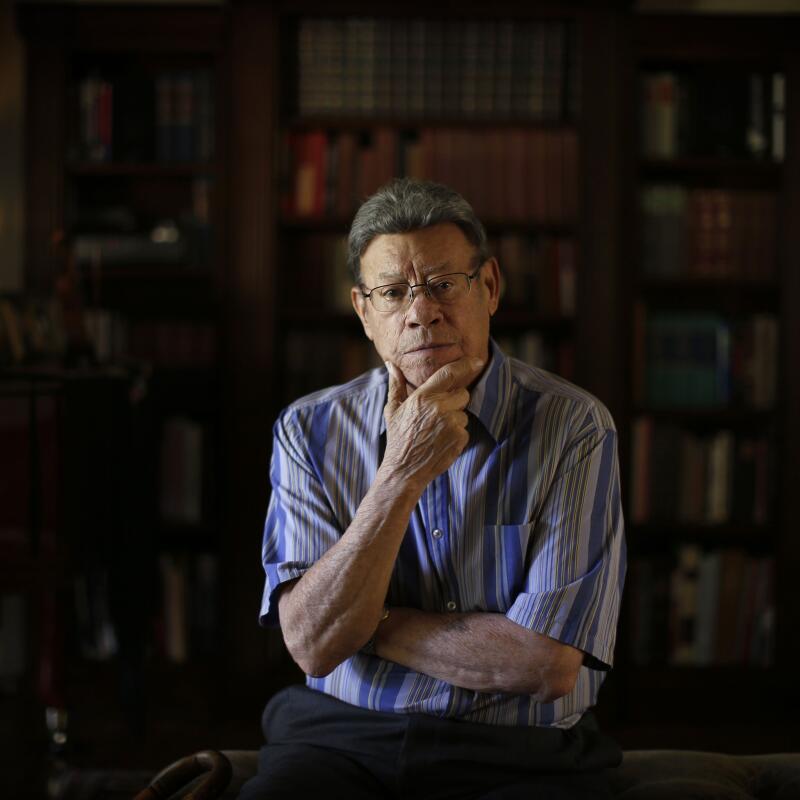
1. Richard Alatorre is among the L.A. politicians with roots in Arizona mining towns. (Carolyn Cole / Los Angeles Times) 2. The list includes Romana Acosta Bañuelos. (Bettmann Archive via Getty Images) 3. Esteban Torres also hails from mine country. (Barbara Davidson / Los Angeles Times)
My maternal grandmother, Marcela Miranda Fernández, was born in 1912 near Clifton, in a town called Metcalf. Her future husband, my maternal grandfather, José Miranda Bermúdez, spent time there as a child before migrating to Anaheim to pick oranges.
My grandparents were always vague when they spoke about Metcalf — but I had vowed to visit one day. A reporting trip to see how Latino voters were faring as the presidential election approached was as good a reason as any.
And now I had another question: Why would anyone want to stay in a place so many had left?

The 1970 U.S. census recorded Clifton’s population as 5,079. A crippling strike in the early 1980s led to the decertification of the miners union and spurred an exodus. By 2002, only about 2,600 people remained, according to Greenlee County statistics.
One of those who left was Janeene Carrillo.
“Growing up here was amazing,” she told me as we enjoyed breakfast at the Little Frisco, a newish diner in town. (Random L.A. connection: She’s related to the Arechigas, one of the last families evicted from Chavez Ravine). “It was probably the best childhood any kid could have. Because you’re safe. Everyone knows everyone.”
But other than the mines, opportunities were limited. After graduating high school in the late 1990s, she headed to Phoenix to study acting.
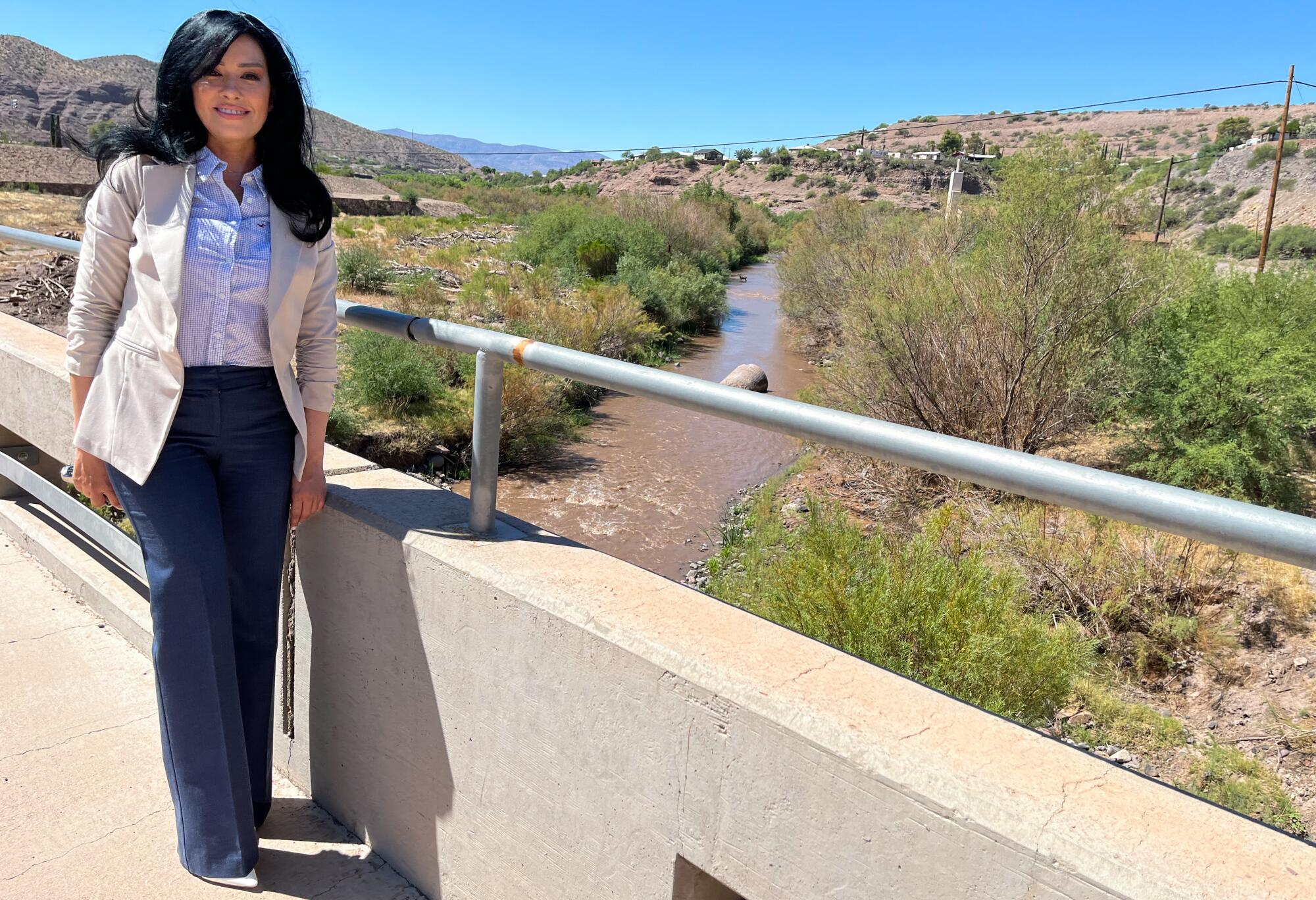
Janeene Carrillo, councilmember for the town of Clifton, Ariz., on a bridge overlooking the San Francisco River. The 45-year-old wants to bring businesses to the mining town in anticipation of Clifton’s main source of employment, the nearby Morenci copper mine, shutting down in the future.
(Gustavo Arellano / Los Angeles Times)
Family matters brought her back home in 2012, and she began thinking about how to make Clifton a place where people wanted to stay.
Today, she is a member of the town council, and Clifton is staging a modest comeback. The most recent census pegged the population at nearly 4,000. The median household income is $78,862, fueled by a boom in mining jobs, while the cost of living has remained low.
“We’re getting people from New Mexico, from even the Midwest,” said Carrillo, 45, picking at an omelet. “I’ve seen people come from Mississippi, from Alabama. We’re a work in progress.”
Now a security guard for Freeport-McMoRan, she is the third generation of her family to work at the mine. Wearing a cream-colored sports coat, Carrillo brushed her perfectly coiffed, jet black hair out of her eyes while we talked. Her urban polish was a contrast to the stereotypical copper country getup of checkered shirt, western-style belt buckle, bolo tie and Stetson hat.
Once [Donald] Trump came around, I decided that’s not the Republican that I am.
— Janeene Carrillo
In Phoenix, Carrillo ditched acting after the double gut punch of a cousin’s murder and the Sept. 11, 2001, terrorist attacks made her feel that government was too lax on “bad guys.” She volunteered for the Maricopa County Sheriff’s Department and helped to process passports, realizing that “a lot of people need a voice because they don’t have it.”
The divisions that surfaced in the 2016 election made her ditch the GOP, become an independent and get involved in politics.
“Once [Donald] Trump came around, I decided that’s not the Republican that I am,” said Carrillo, who is “into hearing both sides.”
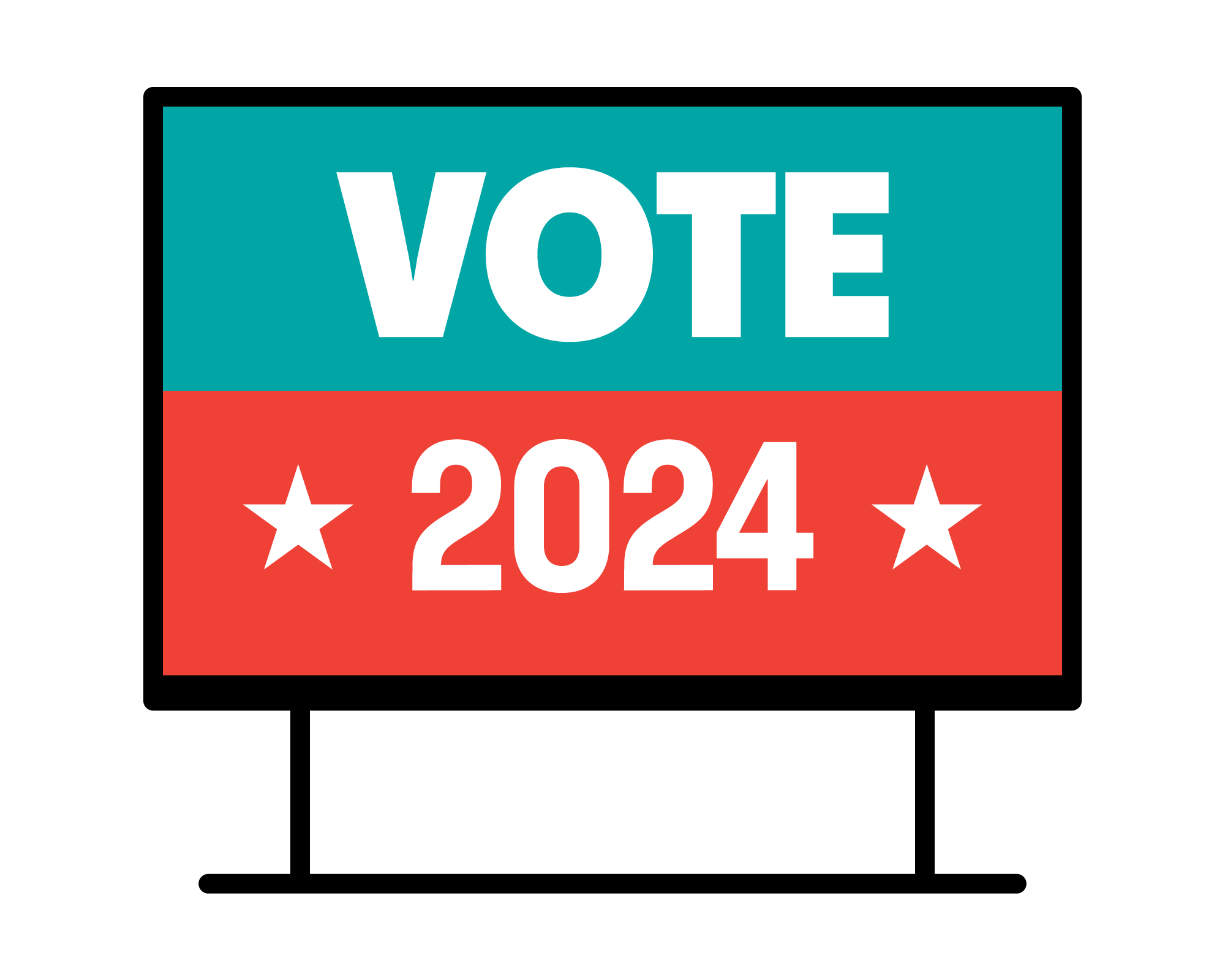
She voted for Joe Biden in 2020 and plans to vote for Kamala Harris this year out of distaste for Trump’s “disrespect” toward military veterans.
“And I really got passionate about the right and the wrong, and how some [politicians] can get away with things, especially when running for president, you know?” she said.
Carrillo worked as a town clerk to learn the mechanics of local government, then unsuccessfully applied for an open council seat in 2021. The following year, she beat an incumbent.
“We needed something different — someone new, someone younger,” Carrillo responded when I asked why she won. “I felt like I’m looking at Clifton, like I’m on new ground. Because I never lived here as an adult, I can see what’s wrong, what’s broken. I can see the faults. I can see the patterns and what Clifton needs.”
What does her hometown need?
“There’s always talk about how the mine is probably only going to be working until maybe 2045,” she said. “And I don’t want Clifton to be dependent on the mine.”
She mentioned bringing in national chains — an Old Navy, a Target, even a Boston Market — so people don’t have to drive to Safford or beyond for necessities, and a truck stop to take advantage of the traffic that passes through. The jobs and revenue would allow Clifton to offer more municipal services, such as youth sports.
The problem, she said, is that no one outside Clifton pays attention to it.
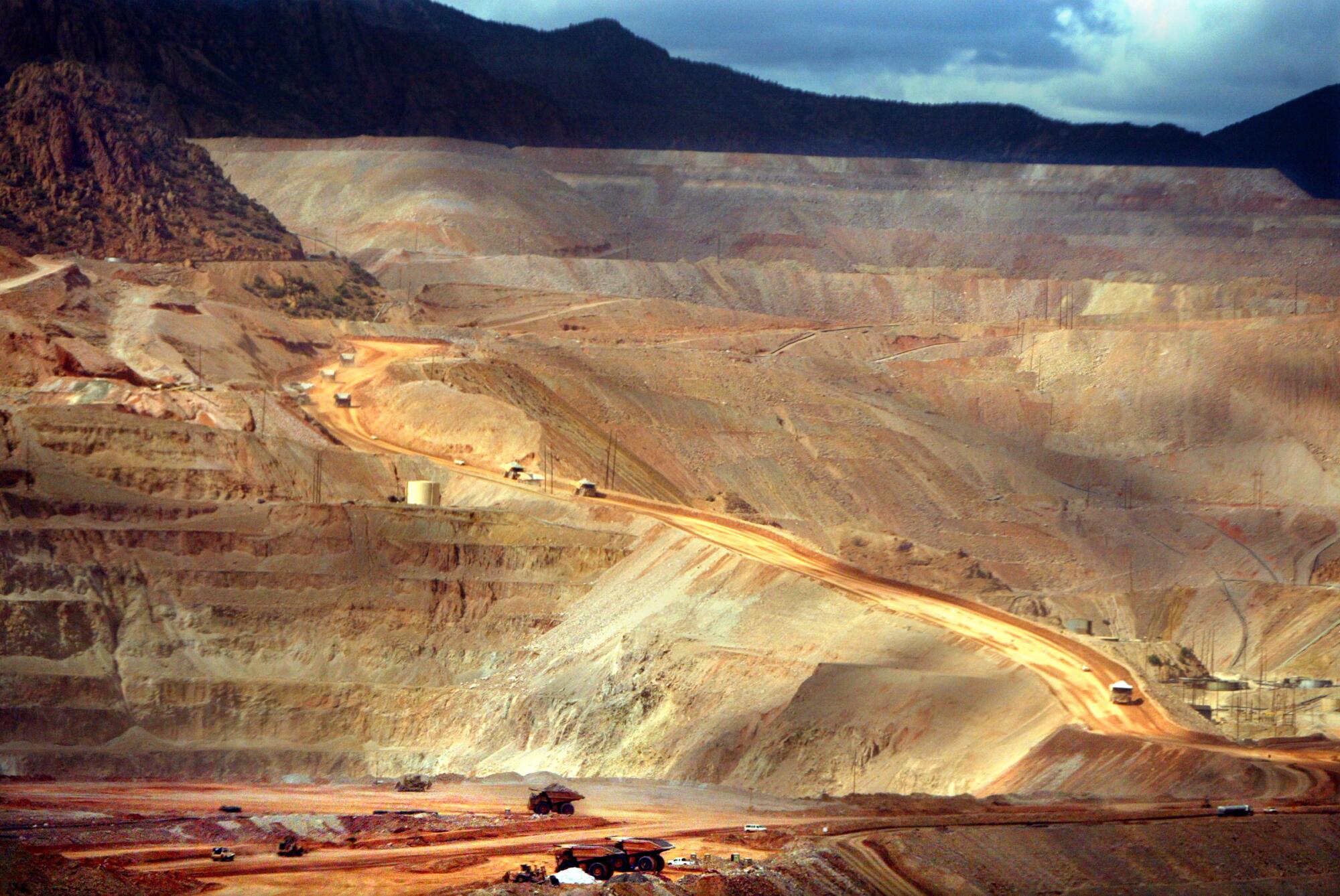
In Clifton, Ariz., the median household income is $78,862, fueled by a boom in mining jobs, while the cost of living has remained low. The open–pit copper mine in nearby Morenci, shown in 2004, is a major employer.
(Mark Boster / Los Angeles Times)
“On the news, when they’re doing the weather, they totally ignore us,” she said, frowning. “All they say is, ‘Oh, precipitation is moving to the east,’ but they don’t say the name. And I’m like, ‘Why don’t they say our name?’”
This erasure also applies to Clifton’s miners, I pointed out. The archetypal American miner nowadays is from Appalachia — Trump rallied with them in West Virginia. The Biden administration, including Harris as vice president, promised to invest hundreds of millions of dollars in moribund coal towns. This year, it announced that Freeport-McMoRan would receive up to $80 million to invest in clean energy to operate the Morenci mine — but none of the money would go directly to towns such as Clifton.
“Latinos have given so much to the mining industry because of the struggles that they have to … overcome,” Carrillo said, describing how Mexicans in the area were once buried apart from whites, and housing segregation existed right up to the 1970s.
“We need our stories told,” she continued. “We need Americans to know what we’ve accomplished — we help build the United States.”

Does discrimination still exist in Clifton? The town is 54% Latino and 38% white.
“Everyone is married with everyone nowadays, and that’s great,” she said with a grin. I looked around Little Frisco, and Carrillo was right. Mixed race couples ate breakfast with their children in tow.
I said I was surprised to not see any presidential campaign posters in town, amid a plethora of local ones.
In 2020, Trump won two-thirds of the vote in Greenlee County while losing Arizona in a squeaker he falsely maintains was stolen. But on the drive to Clifton, I had seen few signs of the county’s red heart — or of national politics at all.
“No one wants to get into feuds,” Carrillo said. “Because you have to be seeing everybody — you know, much more than what you would in the city. I think everyone’s really careful on how they display who they’re voting for.”
Carrillo attributed the local support for Trump — especially among Latinos — to the overtures he has made to the mining industry.
But she thinks the Biden administration’s investment in the Morenci mine may help Harris make inroads in Greenlee County this year.
“They’re seeking a candidate who supports” the hometown’s livelihood, Carrillo said.
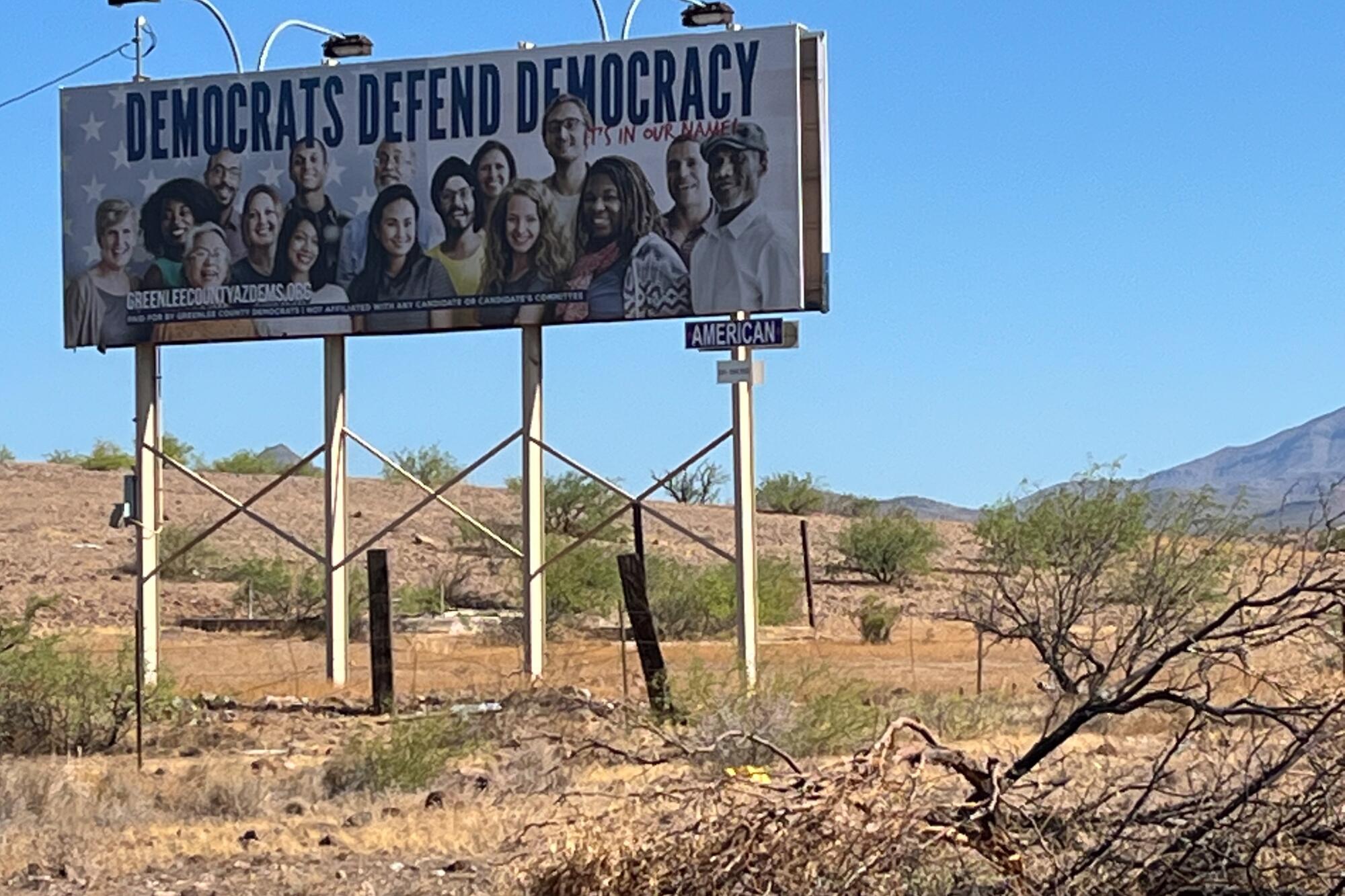
A billboard promoting the Greenlee County Democratic Party near the unincorporated community of Three Way, Ariz. In 2020, Donald Trump won two-thirds of the vote in Greenlee County while losing Arizona.
(Gustavo Arellano / Los Angeles Times)
After taking some photos at a historic bridge spanning the San Francisco River, we drove up U.S. Route 191 to Metcalf, where my grandmother was born. Beyond a gate was a hill as tall as a high-rise building — turned into a dump for the Morenci mine in the 1930s. Somewhere underneath the detritus was the town, buried and abandoned.
I texted a photo to some of my cousins with the note, “Somos de aquí.”
We’re from here.
Suddenly, a Greenlee County sheriff’s vehicle made a U-turn, flashed its lights and drove directly toward us.
“Everything all right here?” Deputy Daniel Medina asked as he got out of his car. “There was a crash here recently, so I want to make sure you guys were OK.”
The name sounded familiar.
“Hey, you’re running for sheriff — I saw your signs!” I exclaimed, identifying myself as a reporter.
He smiled, greeted Carrillo, excused himself and drove off.
I soon left Clifton as well, taking winding back roads toward my next stop. Signs for Medina and his opponents were everywhere. For Harris or Trump?
None.

Politics
Trump signs order to protect Venezuela oil revenue held in US accounts

NEWYou can now listen to Fox News articles!
President Donald Trump has signed an executive order blocking U.S. courts from seizing Venezuelan oil revenues held in American Treasury accounts.
The order states that court action against the funds would undermine U.S. national security and foreign policy objectives.
CLICK HERE TO DOWNLOAD THE FOX NEWS APP
President Donald Trump is pictured signing two executive orders on Sept. 19, 2025, establishing the “Trump Gold Card” and introducing a $100,000 fee for H-1B visas. He signed another executive order recently protecting oil revenue. (Andrew Harnik/Getty Images)
Trump signed the order on Friday, the same day that he met with nearly two dozen top oil and gas executives at the White House.
The president said American energy companies will invest $100 billion to rebuild Venezuela’s “rotting” oil infrastructure and push production to record levels following the capture of Venezuelan dictator Nicolás Maduro.
The U.S. has moved aggressively to take control of Venezuela’s oil future following the collapse of the Maduro regime.
This is a developing story. Please check back for updates.
Politics
Column: Some leaders will do anything to cling to positions of power

One of the most important political stories in American history — one that is particularly germane to our current, tumultuous time — unfolded in Los Angeles some 65 years ago.
Sen. John F. Kennedy, a Catholic, had just received his party’s nomination for president and in turn he shunned the desires of his most liberal supporters by choosing a conservative out of Texas as his running mate. He did so in large part to address concerns that his faith would somehow usurp his oath to uphold the Constitution. The last time the Democrats nominated a Catholic — New York Gov. Al Smith in 1928 — he lost in a landslide, so folks were more than a little jittery about Kennedy’s chances.
“I am fully aware of the fact that the Democratic Party, by nominating someone of my faith, has taken on what many regard as a new and hazardous risk,” Kennedy told the crowd at the Memorial Coliseum. “But I look at it this way: The Democratic Party has once again placed its confidence in the American people, and in their ability to render a free, fair judgment.”
The most important part of the story is what happened before Kennedy gave that acceptance speech.
While his faith made party leaders nervous, they were downright afraid of the impact a civil rights protest during the Democratic National Convention could have on November’s election. This was 1960. The year began with Black college students challenging segregation with lunch counter sit-ins across the Deep South, and by spring the Student Nonviolent Coordinating Committee had formed. The Rev. Martin Luther King Jr. was not the organizer of the protest at the convention, but he planned to be there, guaranteeing media attention. To try to prevent this whole scene, the most powerful Black man in Congress was sent to stop him.
The Rev. Adam Clayton Powell Jr. was also a warrior for civil rights, but the House representative preferred the legislative approach, where backroom deals were quietly made and his power most concentrated. He and King wanted the same things for Black people. But Powell — who was first elected to Congress in 1944, the same year King enrolled at Morehouse College at the age of 15 — was threatened by the younger man’s growing influence. He was also concerned that his inability to stop the protest at the convention would harm his chance to become chairman of a House committee.
And so Powell — the son of a preacher, and himself a Baptist preacher in Harlem — told King that if he didn’t cancel, Powell would tell journalists a lie that King was having a homosexual affair with his mentor, Bayard Rustin. King stuck to his plan and led a protest — even though such a rumor would not only have harmed King, but also would have undermined the credibility of the entire civil rights movement. Remember, this was 1960. Before the March on Washington, before passage of the Voting Rights Act, before the dismantling of the very Jim Crow laws Powell had vowed to dismantle when first running for office.
That threat, my friends, is the most important part of the story.
It’s not that Powell didn’t want the best for the country. It’s just that he wanted to be seen as the one doing it and was willing to derail the good stemming from the civil rights movement to secure his own place in power. There have always been people willing to make such trade-offs. Sometimes they dress up their intentions with scriptures to make it more palatable; other times they play on our darkest fears. They do not care how many people get hurt in the process, even if it’s the same people they profess to care for.
That was true in Los Angeles in 1960.
That was true in Washington, D.C., on Jan. 6, 2021.
That is true in the streets of America today.
Whether we are talking about an older pastor who is threatened by the growing influence of a younger voice or a president clinging to office after losing an election: To remain king, some men are willing to burn the entire kingdom down.
YouTube: @LZGrandersonShow
Politics
Federal judge blocks Trump from cutting childcare funds to Democratic states over fraud concerns

NEWYou can now listen to Fox News articles!
A federal judge Friday temporarily blocked the Trump administration from stopping subsidies on childcare programs in five states, including Minnesota, amid allegations of fraud.
U.S. District Judge Arun Subramanian, a Biden appointee, didn’t rule on the legality of the funding freeze, but said the states had met the legal threshold to maintain the “status quo” on funding for at least two weeks while arguments continue.
On Tuesday, the U.S. Department of Health and Human Services (HHS) said it would withhold funds for programs in five Democratic states over fraud concerns.
The programs include the Child Care and Development Fund, the Temporary Assistance for Needy Families program, and the Social Services Block Grant, all of which help needy families.
USDA IMMEDIATELY SUSPENDS ALL FEDERAL FUNDING TO MINNESOTA AMID FRAUD INVESTIGATION
On Tuesday, the U.S. Department of Health and Human Services said it would withhold funds for programs in five Democratic states over fraud concerns. (AP Photo/Jose Luis Magana, File)
“Families who rely on childcare and family assistance programs deserve confidence that these resources are used lawfully and for their intended purpose,” HHS Deputy Secretary Jim O’Neill said in a statement on Tuesday.
The states, which include California, Colorado, Illinois, Minnesota and New York, argued in court filings that the federal government didn’t have the legal right to end the funds and that the new policy is creating “operational chaos” in the states.
U.S. District Judge Arun Subramanian at his nomination hearing in 2022. (Tom Williams/CQ-Roll Call, Inc via Getty Images)
In total, the states said they receive more than $10 billion in federal funding for the programs.
HHS said it had “reason to believe” that the programs were offering funds to people in the country illegally.
‘TIP OF THE ICEBERG’: SENATE REPUBLICANS PRESS GOV WALZ OVER MINNESOTA FRAUD SCANDAL
The table above shows the five states and their social safety net funding for various programs which are being withheld by the Trump administration over allegations of fraud. (AP Digital Embed)
New York Attorney General Letitia James, who is leading the lawsuit, called the ruling a “critical victory for families whose lives have been upended by this administration’s cruelty.”
New York Attorney General Letitia James, who is leading the lawsuit, called the ruling a “critical victory for families whose lives have been upended by this administration’s cruelty.” (Win McNamee/Getty Images)
CLICK HERE TO DOWNLOAD THE FOX NEWS APP
Fox News Digital has reached out to HHS for comment.
-

 Detroit, MI7 days ago
Detroit, MI7 days ago2 hospitalized after shooting on Lodge Freeway in Detroit
-

 Technology4 days ago
Technology4 days agoPower bank feature creep is out of control
-

 Dallas, TX5 days ago
Dallas, TX5 days agoDefensive coordinator candidates who could improve Cowboys’ brutal secondary in 2026
-

 Dallas, TX2 days ago
Dallas, TX2 days agoAnti-ICE protest outside Dallas City Hall follows deadly shooting in Minneapolis
-

 Iowa4 days ago
Iowa4 days agoPat McAfee praises Audi Crooks, plays hype song for Iowa State star
-

 Delaware2 days ago
Delaware2 days agoMERR responds to dead humpback whale washed up near Bethany Beach
-

 Health6 days ago
Health6 days agoViral New Year reset routine is helping people adopt healthier habits
-

 Nebraska4 days ago
Nebraska4 days agoOregon State LB transfer Dexter Foster commits to Nebraska

















